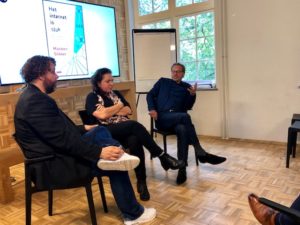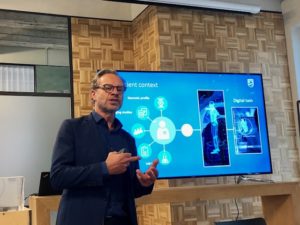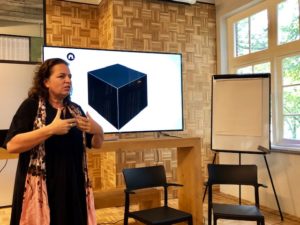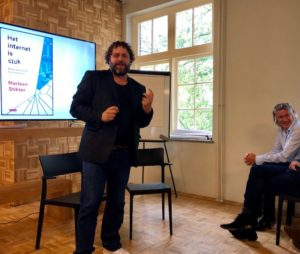Applying data science and AI to healthcare: Oil or Oxygen?
Who should own the data that gets used in MedTech and personal health applications? Is data really ‘the new oil’, a resource to be controlled by the few? Or should data be seen as a universal human right, like oxygen?
In a World AI Week panel discussion, the disparate participants all agreed: we need to develop well-thought-out protocols quickly, otherwise the likes of China and Amazon will soon run the show.
Personal data: getting to the kidney of the matter
On 8 October 2019, Smart Health Amsterdam and IJsfontein presented an interactive panel to discuss ‘How can we use AI to promote healthy living? Can AI enhance the health of Amsterdam citizens?’
But these questions were soon cast aside. According to the three panellists – Boardmembers Jeroen Tas from Philips, Marleen Stikker of the Waag Society and the City of Amsterdam’s Ger Baron – there are more pressing matters to discuss: how to develop an efficient and trusted data-sharing system.

Serving the patient
Jeroen Tas is the Chief Innovation & Strategy Officer at Philips, with an impressive background as entrepreneur and driver of innovation in the financial sector. But in 2003, he started pivoting toward healthcare, for very personal reasons.

Tas came to understand how his daughter’s quality of life could be vastly improved through the application of data science and AI. Perhaps one day it can even offer her a cure.
Chasing reality with multiple views
Whether doctors are dealing with diseases such as diabetes or cancer, it’s important to get the fullest context possible. “It’s like how self-driving cars function,” observes Tas. “You need many different angles and approaches to get a full picture of reality. Only then can it become effective. And this is especially true with cancer, since every case is different.”
In short, mere mortals are incapable of digesting all this information. “Only AI can help us achieve all these profound goals,” says Tas. “Plus, 95% of cancers are treated in community hospitals, but without being able to tap into a global network of knowledge, expertise and best practises, it’s almost impossible to make the right diagnosis and the right treatment. Once AI gets applied, each of these hospitals could become part of such a global network and be enabled to provide world-class treatments.”
Meanwhile there are 80 hospitals in the Netherlands who are most often still not sharing their data – while most of their patients would be more than happy for their data to be used in research if it was anonymised. We need a trustworthy space to bring all the information we have together. And according to Tas, it wouldn’t be that difficult: “I see it as a sort of data donorship – like with organs. And the technologies required are already available. The information can just be stored in blockchain.”
“Yes, there are potential downsides, but the upsides are so potentially huge that we need to invest, and fast. Otherwise it will be China and companies like Amazon that own the landscape – and the data. At Philips, we don’t need to own the data. We just want to use it.”
Open, fair, inclusive
The last thing Marleen Stikker wants is for the Alibabas and Amazons of this world to control healthcare. As founder and managing director of the research institute Waag Society, she focuses on “technology as an instrument of social change,” and is guided by the “values of fairness, openness and inclusivity.” She fiercely believes in the democratisation of technology and transparency in dealing with data and algorithms.

At that moment the laptop powering her slideshow freezes. “And as you see: Tech also fails us!”
Cracking open the black box
“We first have to understand what we’re doing,” continues Stikker. “And here arises the ‘black box problem’: we don’t understand what we use. We don’t know who’s defining success. And companies are using the excuse: this is our business model, this is proprietary. So, we need an impartial third party to have a look inside this black box. To look at the true motivations. To look at the biases. To expel those like Amazon who take the data as theirs and build systems you cannot escape. This is not Black Mirror; it’s happening right now.”
Her solution: developing a Digital Commons in which Amsterdammers – and potentially all world’s citizens – can determine the data they share, whom they share it with and for what purposes,” says Stikker. “Like Linux, it’s not owned, yet there’s still a whole market built up around it.”
While Tas reminds her that Philips works in a highly competitive world and speed is of the essence, he does agree with the idea of a Commons in principle. “You have to create a neutral space – a utility,” he says. “But who will administer this? Who will pay for it?”
The middle path
Ger Baron, Amsterdam’s Chief Technical Officer, believes the city can play a strong role setting up such a system; a role backed by tax funds and reflection. “We live in an amazing age. It’s a time of big questions. Who owns the data? Who owns the earth?”

“We need to treat this as one big design question, bringing together economists and engineers. And we must learn from the past. At one point we all jumped on oil and automobiles. What has that got us? Climate change and congested cities. That’s why I think it’s good that there’s a lot of discussion around AI.”
Baron also believes the system should include checks and balances. “We need a new kind of accountant that can look into these black boxes. To check the methodology and know how it works before it goes out to Amsterdam’s citizens. We don’t want to make mistakes because the opportunities are too huge.”
But Baron admits this process of developing regulations might slow things down. “But in the long run, it will make it all easier. It’s still a mess everywhere – and we’d be first to have such a system before rolling it out across the EU. Just think, for example, about the potential lawsuits that might be avoided.”
Tas now seems to be in less of a rush, too: “I think the place to start is with patient organisations”.
Is the show now truly on the road?
Text: Steve Korver, Edenfrost
11 October 2019
Read more about
Contact us
Want to keep up to date?
Get the best regional news and events (in Dutch) via the Board Update newsletter
Share this news
Want to keep informed?
Follow us daily on LinkedIn and sign up for the Board Update newsletter.
Read more
- On 14 and 15 October, board members of the Amsterdam Economic Board convened for ...
- Focusing more on women in health care innovation and research will have ...
- What is the Amsterdam Metropolitan Area’s position on critical raw materials? ...

